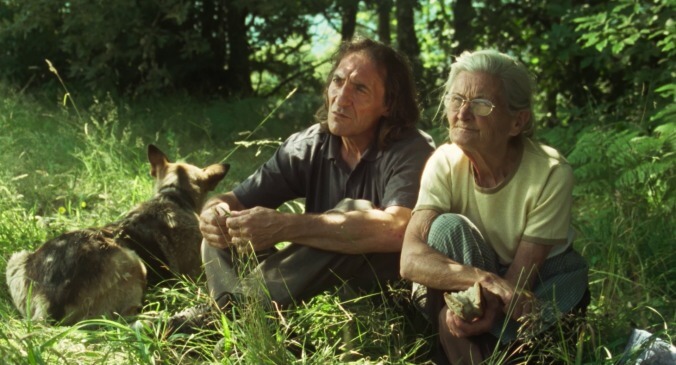
Oliver Laxe’s Fire Will Come opens at night in a forest somewhere in Galicia, the mountainous region of northwestern Spain. A strange light passes through the trees; it could be a helicopter or a UFO. The silence is broken by crunching, cracking noises. The trees begin to topple. Monstrous bulldozers are rolling through the forest, coming to a stop as solemn baroque music invades the soundtrack. One almost expects to hear the voice of Werner Herzog, making grim pronouncements about the madhouse of man and nature; while the director’s Teutonic narration has been a subject of countless impressions and parodies, Laxe might be the only filmmaker of the younger generation to evoke a Herzog aesthetic.
This was even perhaps even more evident in his previous feature, Mimosas, an eccentric, primitivist fairy tale about bandits, mute princesses, and dead sheiks that boasted plenty of inhospitable scenery, but was equally fascinated by human strangeness. For much of its running time, his follow-up comes across as a quieter, more conventional type of art film parable. One might even go so far as to say that the simple plot—about an introverted, middle-aged pyromaniac who returns to his rural community after two years in prison—makes it easier to appreciate its documentary qualities as both a steep, rugged pastoral and an ethnographic record, with a cast of non-professional actors and dialogue in Galician, a language more closely related to Portuguese than to Spanish.
After the opening sequence and a similarly abstract evocation of the mysteries of parole, we are introduced to Amador (Amador Arias), who has come home to live with his elderly mother, Benedicta (Benedicta Sánchez), at their ancient farm, which appears to exist somewhere far beyond the limits of wireless service. Though quiet and gentle, Amador seems all too aware of his reputation as the local firebug. Avoiding contact with the neighbors, he prefers to spend his day tending to his mother’s cows. One can’t help but feel a connection between this patient, muddy toil and the analog values and grainy details of Mauro Herce’s all-natural Super 16mm cinematography.
Galicia accounts for half of all forest fires in Spain, a problem that is partly blamed on invasive eucalyptus trees that were planted during the long dictatorship of Francisco Franco. Given that the Franco regime actively suppressed the Galician language, it isn’t difficult to conclude that some parallel is being drawn about the destruction of communities; though Laxe was born in France and is based in Morocco, he comes from a Galician family. However, Fire Will Come is for the most part an evocative waiting game, its mood punctured only by a quirky diegetic deployment of Leonard Cohen’s “Suzanne.” Whether Amador is involved or not, at some point, the prophecy of the title has to be fulfilled.
It’s during this eventual conflagration (which was shot during an actual wildfire) that the filmmaking leaps into the elemental. Fire is one of those things that looks more three-dimensional on film; as captured by Laxe and Herce, the leaping orange flames and dangerously glowing cinders take on the scale and volatility of cosmic forces. The locals futilely try to beat the fire back with branches while a farmhouse if engulfed in flames. Compared to this scale of destruction, the community’s resentment of Amador—not to mention the predictable ironic conclusion—feels even pettier. Quiet, slow-moving, ambiguous character studies might be a dime a dozen on the festival circuit, but there are few that remind us that there are things out there that still feel as big as myth.
4 Comments
This sounds good. The fact that the director uses Leonard Cohen’s “Suzanne” definitely suggests a Herzog influence (IIRC, Herzog used it in Fata Morgana).
Most linguists consider Galician an outright dialect of Portuguese. (Of course, the distinction between “dialect” and “language” is often hazy, and where it gets drawn often has more to do with politics and power than linguistic realities.)
“A language is a dialect with an army and a navy. “ – Max Weinreich
The film is moody and gorgeous and worth it already for that first sequence, one of the most otherworldly scenes I’ve ever seen in a film. At the same time, I finally found the film so ambiguous and elliptic, it ended up vague and almost kind of arbitrary: it could have been Amador – or not. He’s so internalised, he finally became something of a blank. The actor’s face is supremely expressive, but for me it ended up expressing surprisingly little. I usually like elliptic films, but the longer the film went on, the less I felt it gave me to work with.
Still: that first scene is so striking, it’s worth it all by itself. (We were lucky to see the film at a, albeit small, cinema; I don’t know how much the visuals lose on a TV screen.)